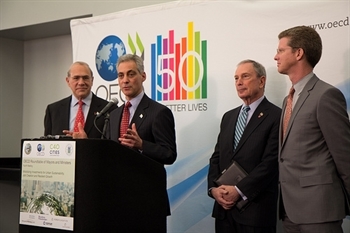
Ryan Griffin-Stegink
MPC President MarySue Barrett led a panel discussion on transportation finance at the March 8 OECD event.
When we see something broken in our community that needs fixing, most of us aren’t quite sure if it’s our municipal, state, or federal elected officials whose feet need to be held to the fire. Though I’m frustrated with bankrupt governments and finger-pointing – no, more than frustrated, I’m angry – I’m not looking to assess blame. We all just want things to work, in our neighborhoods, our regions – our lives.
Here in “America’s city,” the early spring has brought shoots of insight on what’s working and what’s not working, economically speaking. In the past two weeks, two reports – one by our local World Business Chicago and one by the international Organization for Economic Cooperation and Development (OECD) – have hammered home that, well, we’ve got some work to do.

Chicago Mayor Rahm Emanuel is channeling his energies into World Business Chicago’s Plan for Economic Growth and Jobs, which soberly diagnoses the impact of the prior “lost decade.” The plan lays out a framework to re-wire our economic neurobiology. Just like a parent with a whiny child has to re-teach their youngster that tantrums don’t yield treats, our region needs to re-program itself. Expecting sectors to “go it alone” in identifying a skilled workforce or solving its infrastructure challenges is short-sighted. The WBC plan identifies strong and emerging sectors that, if we listen to what they need and try different approaches, can lead us out of this recession.
I was one of those involved with the World Business Chicago task force that was expertly assisted by the Brookings Institution’s Metropolitan Policy Program and a talented team from McKinsey, and I’m eager for the next phase: implementation partnerships. The Plan does not detail all the strategies and tactics, for a good reason: Many more leaders have to be involved in coordinated implementation – and that will take many forms.
For instance, the day after the announcement of his Plan, Mayor Emanuel gave us a taste of the future impact of a new kind of public-private partnership that is balanced and transparent. President Bill Clinton participated in the announcement of a local Infrastructure Trust, driving home the point that innovative tools for financing water, sewer, energy, and transit infrastructure needs are being used routinely around the globe, but are still fairly new in the U.S. “Conflict may be good politics but it’s terrible economics,” said the former President. “I’m here because I want to draw attention to something good that’s working.” Mayor Emanuel beamed and proceeded to outline initial energy efficiency improvements that would recoup their costs, and transformative infrastructure investments, such as Bus Rapid Transit.
The opportunity for Chicago to be a national model on innovative financing and regional coordination was emphasized for me at last week’s prestigious meeting in Chicago of the OECD. The Metropolitan Planning Council was honored to be asked by Mayor Emanuel’s team to be the local host. Some of my duties were ceremonial; I admit to being star-struck at sharing a meal with the former Prime Minister of Canada, meeting the mayors of the Chicago Sister Cities of Warsaw and Casablanca, and sharing the luncheon podium with OECD Sec.-Gen. Angel Gurria.
If you’d like to know more about the OECD’s report on the tri-state economy that was released a day after the private meeting of Mayors and Ministers, check out this thoughtful article from the University of Chicago’s Paula Worthington. As for my own observations, the 300-page report details many of the reasons why Chicagoland’s growth checks in at a depressing 22nd place among top U.S. metros. One reason highlighted is a proliferation of governments. MPC has been involved with five multi-town collaborations that have voluntarily combined staff and coordinated strategies, with early solid results.
During the OECD roundtable, I had the chance to dig into a lot of substance quickly as a participant in the discussion with 40 mayors and ministers from around the world. One of the co-hosts was U.S. Dept. of Housing and Urban Development Secretary Shaun Donovan, who urged regions to celebrate and build on their unique assets. He also laid out three common denominators of success: 1) that companies follow talent, and talent gravitates to great places; 2) that global economic austerity is an opportunity for regions to chart a new course, citing the Chicago Metropolitan Agency for Planning’s GO TO 2040 Plan; and 3) that bridging inequality is a test we cannot fail.
I facilitated a panel on transportation finance. Aided by an unforgiving clock that allotted each speaker just three minutes, I learned about innovative infrastructure partnerships in Manchester, England; Venice, Italy; Australia; and Luxembourg. Watch MPC’s blog, The Connector, for new stories from around the globe in our Value Capture series curated by Chrissy Nichols. When I reported on our panel discussion during the closing plenary, I emphasized that national governments must remove barriers to innovative finance, reward regions that measure results and stay disciplined on their priorities, and facilitate cross-fertilization of groundbreaking ideas and tools.
Perhaps most compelling to me – and a theme that underlay both the day and Mayor Emanuel’s new economic plan – was the observation from the Ford Foundation’s George McCarthy: He said the most valuable insights he drew were about how successful regions are sparking collective, coordinated action and finding ways for untraditional partnerships to take root. At MPC, we’re also starting to see traction in related methods, and we’ll continue to share Chicago’s stories of success on this blog in the coming weeks and months.